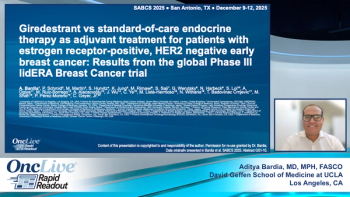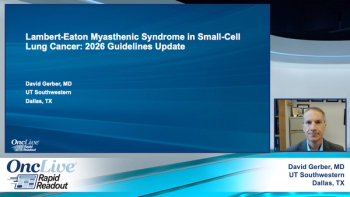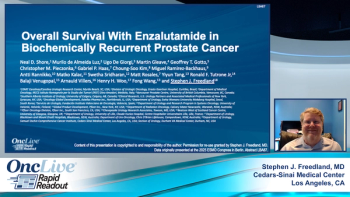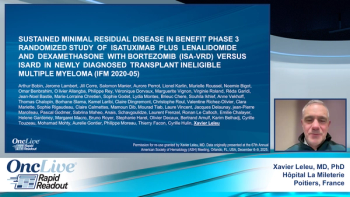
|Videos|July 1, 2021
Rapid Readouts: Results from two trials of TRK inhibitor, larotrectinib, in patients with TRK fusion-positive lung cancer
Alexander Drilon, MD presents data from the 2021 American Society of Clinical Oncology annual meeting from trials in adult and pediatric patients with tropomyosin receptor kinase (TRK) fusion-positive lung cancer treated with larotrectinib.
Advertisement
Alexander Drilon, MD, discusses data from the following presentation:
- Long-term efficacy and safety of larotrectinib in patients with TRK fusion-positive lung cancer (Lin, 2021 ASCO Annual Meeting, abstract # 9109)
- The objective of this presentation is to report updated results in patients with TRK fusion-positive lung cancers from the phase II adult/pediatric NAVIGATE basket trial (NCT02576431) and an adult phase 1 trial (NCT02122913) where patients were treated with larotrectinib.
- Baseline characteristics
- Central nervous system (CNS) metastases at baseline: 10 (50%) yes, 10 (50%) no
- NTRK gene fusions (n = 20): NTRK1 80%; NTRK2 0%; NTRK3 20%
- Tumor histology: 19 (95%) adenocarcinoma, 1 (5%) neuroendocrine carcinoma
- Conclusions: efficacy
- In all evaluable patients (n = 15), the overall response rate (ORR) was 73%, including 1 (7%) complete response, 10 (67%) partial response, 3 (20%) stable disease, and 1 (7%) progressive disease; responses were durable with a median progression-free survival (PFS) of 35.4 months and median duration of response of 33.9 months. Median overall survival was 40.7 months.
- In patients with CNS metastases (n = 10), the ORR was 63%, including 5 (52%) partial response, 2 (25%) stable disease, and 1 (13%) progressive disease.
- Conclusions: safety
- Treatment-related adverse events (TRAEs) were predominantly grade 1 and 2.
- TRAEs were reported by 16 patients (80%); 2 patients (10%) experienced grade 3 TRAE (myalgia, hypersensitivity, and weight increase).
- Two patients (10%) required dose reduction due to AEs: grade 2 ALT and grade 2 AST increase in 1 patient and grade 2 neutrophil count decrease in the other patient; there were no treatment discontinuations due to AEs.
Advertisement
Latest CME
Advertisement
Advertisement
Trending on OncLive
1
Long-Term Cilta-Cel Data Show Low Rates of PFS Events in Standard-Risk R/R Myeloma
2
Nonresponse to Bridging Therapy and Peak ALC After Cilta-Cel Are Associated With Neurotoxicity, NRM in Myeloma
3
FDA Updates Axi-Cel Label to Remove Limitation of Use in R/R PCNSL
4
FDA Underscores Risks Associated With DPD Deficiency and Capecitabine/5-FU Use in Cancer Care
5




































